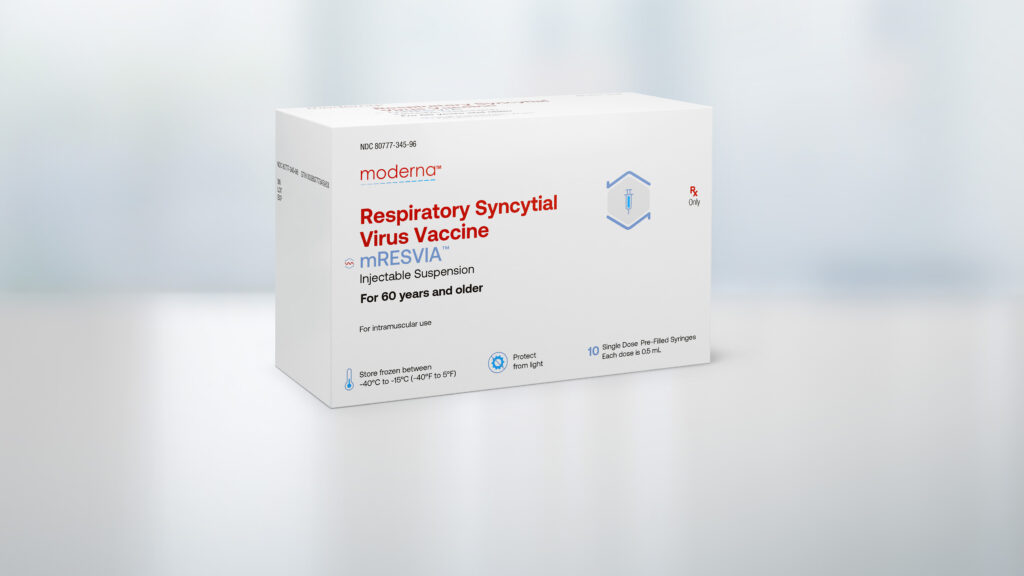The Food and Drug Administration on Friday approved Moderna’s vaccine to protect older adults against respiratory syncytial virus, or RSV, making this the company’s second licensed product.
The Moderna RSV vaccine, which will be marketed under the name mResvia, was approved for adults 60 and older. It is made using the same messenger RNA platform as Moderna’s other licensed product, its Covid-19 vaccine Spikevax.
advertisement
“The FDA approval of our second product, mResvia, builds on the strength and versatility of our mRNA platform,” Moderna CEO Stéphane Bancel said in a statement.
RSV can be contracted at any age, but the infection is more likely to trigger severe illness among infants and the elderly. The Centers for Disease Control and Prevention estimates that between 60,000 and 160,000 adults aged 65 and older are hospitalized in an average year for RSV and between 6,000 and 10,000 die from the infection.
The Moderna vaccine arrives on the market a year after two competitors, GSK’s Arexvy, and Pfizer’s Abrysvo, which were both approved for the same age group. (Pfizer’s vaccine has a second approval for pregnant people as well.)
advertisement
But Moderna said its vaccine is the only one of the three to be packaged in a prefilled syringe, which it argues saves time and cuts the risk of administration errors for pharmacists and other health professionals who administer vaccines.
In a pivotal Phase 3 trial involving nearly 37,000 people in 22 countries, mResvia was shown to have a vaccine efficacy of 83.7% against lower respiratory tract disease caused by RSV.
The company said a follow-up analysis of the primary endpoint was performed during the FDA review; it included cases that started before the primary analysis cut-off date but that were not confirmed until afterward. Those results were similar to the primary analysis, showing a vaccine efficacy of 78.7%, which was not statistically different from the earlier result.
Moderna said there were no serious safety concerns identified during the clinical trials, with injection site pain, fatigue, headache, and muscle and joint pain being the most commonly reported side effects. Importantly, there were no reports of Guillain-Barré syndrome, a form of progressive paralysis from which people generally recover. Both Pfizer and GSK reported cases of GBS in their clinical trials, findings that concerned the expert panel that helps the CDC set recommendations on how licensed vaccines should be used.
The Advisory Committee on Immunization Practices, or ACIP, recommended last year that adults 60 and older could get one of the RSV vaccines, but should discuss the pros and cons with a medical practitioner, forgoing a more emphatic — and perhaps market-boosting — recommendation urging all adults in the eligible age group to get one of the vaccines. An analysis the CDC published this week supported the cause for concern, noting that the rate of reported GBS cases per million doses of vaccine administered was 5.0 cases for the Pfizer product and 1.5 for the GSK. Those rates were both higher than what was seen with Covid vaccines, which were not linked to an increased risk of GBS.
That potential advantage for the Moderna vaccine may be counterbalanced by concerns about the durability of the protection it triggers.
Moderna’s statement said follow-up of participants from its trial showed protection lasted over 8.6 months at least. (When a vaccine is new, it takes time to determine how durable its protection is.) But an analysis issued in February by market analysts TD Cowen questioned if the protection conferred by the Moderna shot wanes more quickly than the protection conferred by its competitors. Both the GSK and Pfizer vaccines appear to protect for at least two cold-and-flu seasons.
Before the Moderna vaccine can be put into use, it must receive a recommendation from the CDC, which only issues advice on how a vaccine should be used after the vaccine has been studied and voted on by the ACIP. That group next meets in late June. Health insurance companies use the CDC’s recommendation to set their coverage policies.
As Moderna waits to clear the final hurdle to get its RSV vaccine into pharmacies, both GSK and Pfizer have already applied to the FDA for license extensions, arguing the vaccines should be offered to adults under the age of 60 who are at high risk of severe illness from RSV infection.
GSK, which used a priority review voucher to speed its application through the approval process, expects to hear whether Arexvy can be targeted at people 50 and older by June 7. Pfizer is seeking a more ambitious license extension, applying to be able to market Abrysvo to adults 18 and older who are at high risk from RSV.
In the first year of use of these vaccines, the CDC estimates that 24.4% of people aged 60 and older received an RSV vaccine.

